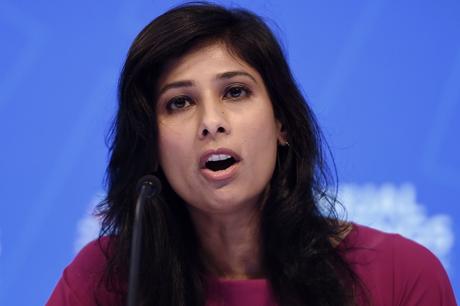
(Washington) Over 12 000 billions of dollars in cumulative loss for the world economy in 2020 and 2021 because of the coronavirus pandemic. This “crisis like no other” is much more severe than expected and the recovery will be slower than expected, warned the International Monetary Fund on Wednesday.
Posted on 24 June 2020 at 9 o'clock22 Updated to 16 h 16
Delphine TOUITOU
France Media Agency
Gita Gopinath, its chief economist, released a 4.9% recession forecast this year. It is much worse than the 3% expected in April, in the heart of the pandemic, when the IMF already stressed that it was the worst crisis since the Great Depression of years 30.
And for certain countries, particularly in Europe, the contraction in gross domestic product is staggering: – 12, 5% for France, – 12, 8% for Spain and Italy.
“A high degree of uncertainty surrounds” these forecasts, recognizes M me Gopinath while the epidemic is not over and homes are re-emerging where it seemed to be contained, such as in Germany where the authorities announced local restructuring on Tuesday.
To date, the COVID pandemic – 19 has made more than 477 500 dead in the world .
No country escapes the ambient pessimism starting with China, where the virus left, end 2019 mortal. The growth of the Asian giant will only be 1%, far from the 6.1% achieved in 2019, already a historic low due to the fact of the trade war with Washington.
The health crisis will be even more devastating for the United States, deprived of a social safety net and despite the gigantic aid plans of the government (some billions of dollars).
The GDP of the world's leading power will thus collapse by 8% compared to 5.9% estimated in April. The recovery in 2021 will be less sustained ( 4.5%).
Everywhere else in the world, catastrophic figures: – 10, 2 % for the euro area countries and for the United Kingdom, -9.4% in the Latin America and Caribbean region, -8% in South Africa, -5.8% in Japan, -4, 7% in the Middle East and Central Asia or -4.5% in India.
The deterioration in forecasts is explained by a more marked impact than expected in the first half and a “partial recovery” at the start of the third quarter.
“Stay alert”
In 2021, global growth should thus reach 5.4% (-0.4%).
Gita Gopinath urged governments to “remain vigilant” because the crisis is not over. “Many countries are already doing a lot” to help businesses and households, she said. They will have to be careful not to return to this aid too quickly, but “gradually”, she also warned.
The IMF is particularly worried about the negative impact on the most vulnerable, which “jeopardizes the significant progress made in reducing extreme poverty in the world over the years 1990 “.
“It is low-income households and low-skilled workers who are most affected by this crisis,” said Gita Gopinath in an interview with AFP. The same people who will take longer to find a job.
“For young people entering the job market right now, it can have a negative impact on the future,” she added.
Worse or better?
However, as for the projections published in April, “there is a higher degree of uncertainty than usual around this forecast”, she underlined.
Ultimately, it could turn out to be worse or better.
Better, if there is for example the discovery of a vaccine and if there are additional government aids that will accelerate the recovery.
On the contrary, “new waves of infections can dampen” the recovery “and tighten financial conditions quickly, causing over-indebtedness,” said Gita Gopinath.
In economies where infection rates are declining, the recovery is currently longer due to the persistence of physical distancing in the second half. It is also “uneven,” says Gita Gopinath. Certain sectors like retail sales rebound while others like “contact-intensive services, hotels, travel and tourism, remain depressed,” she said.
Countries dependent on these sectors will be “likely to be deeply affected for an extended period of time,” said the economist.
For economies still struggling to contain the pandemic, containment measures continue to weigh.
Finally, beyond the pandemic, other risks are compromising the world economy, the IMF underlines, citing “the escalation of tensions between the United States and China”, “the unraveling of relations between the Organization of the Petroleum Exporting Countries (OPEC) and the Coalition of Petroleum Producers “or” social unrest “.

